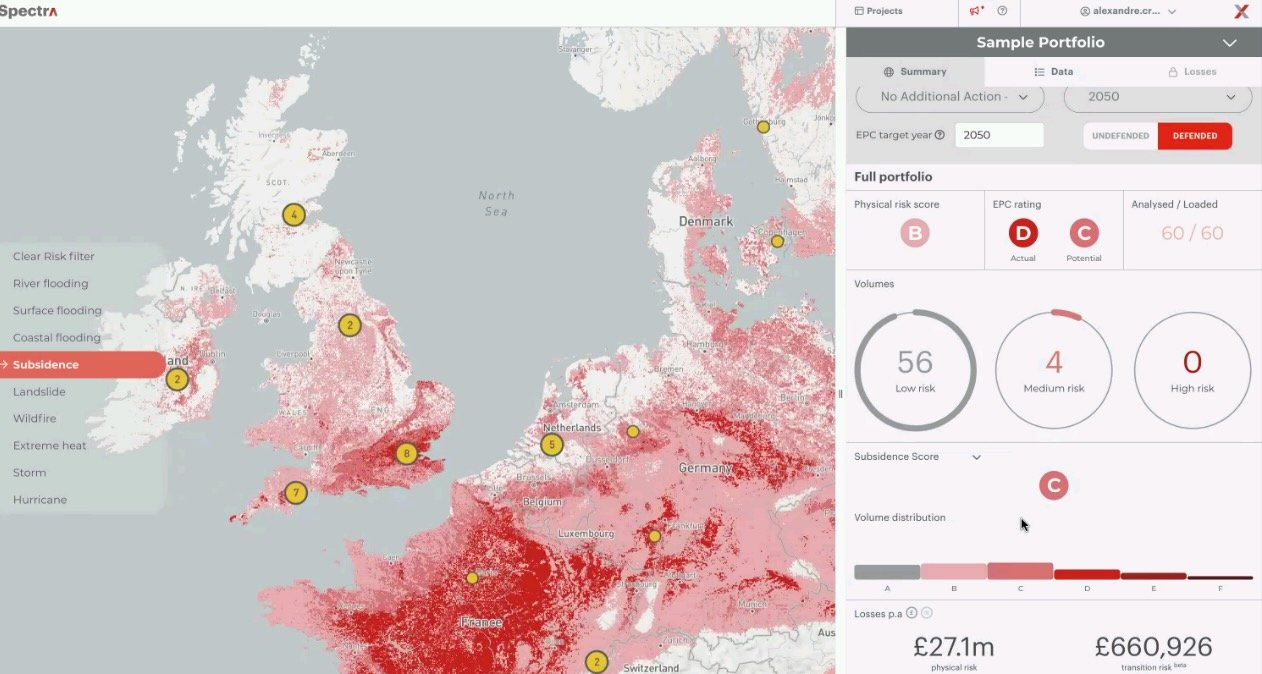Floods are the most common and most costly natural disasters in Europe. They are becoming more frequent due to climate change and have devastating effects, endangering lives and leading to heavy infrastructural and economic losses.
In real estate, extreme weather like flooding causes not only structural property damage, but also a drop in value and increases in insurance costs. And with climate change in mind, regulators are mandating climate stress tests and scenario analysis.
UK company Climate X has developed an on-demand climate risk data analytics platform called Spectra. It allows real estate companies, finance institutions, insurers, energy companies, and governments to envision their climate risk on an asset level.
I spoke to Alexandre Crépault, Climate X's Director of Commercial Strategy and Operations to learn more.
He explained that Spectra acts as a real-life recreation of SimCity "block by block, street by street, we're recreating topography, elevation, vegetation and flood hydrology."
It uses real-world, remote sensing data from satellites, combining it with climate projections to create a "digital twin-Earth" model that overlays locations with specifics such as a building's age and wall type.
This model can be used to simulate the impact of climate change risks such as flooding and natural disasters such as landslides, hurricanes, ice storms, extreme heat and bushfires.
Currently, many industries are focused on the risk associated with action or inadequate action in mitigating climate change, as well as the wider risks to economies, businesses and livelihoods in the coming decades, especially regarding certain economic sectors and specific geographical areas.

Spectra enables firms to meet regulatory compliance and build resiliency by incorporating climate change-related risks into business decisions, pricing and investment strategies.
For example, a real estate company can look across its portfolio at a location-based granular level and simulate extreme weather events under different climate scenarios to see the impact on its location or asset. In response, a company may choose to avoid investing in locations or risk opportunities that exceed its risk tolerance
With "over 20 trillion data points and counting," Climate X can assign a risk rating from A to F and quantify the data into a dollar value to assess the impact. The closer your score to A, the more prepared you are to (excuse the pun) weather a storm.
Crépault notes:
"As part of regulatory and voluntary disclosures, we recommend assessing the evolution of risk in the short, medium, and long term. So we offer these projections from baseline 2020 to the year 2100."
The analysis can also compare defended and undefended scenarios, such as whether flood barriers are constructed in flood-prone areas.
Over the last few years, the UK and Europe have rolled out Energy Performance Certificate ratings to assess and label the energy efficiency of residential and commercial properties, providing an indication of a building's energy efficiency on a scale from A to G and its associated environmental impact in terms of greenhouse gas emissions.
Spectra can complement this by leveraging remote sensing and geocoding for a more detailed analysis. This includes calculating transition risks such as the dollar value of a D rating vs a C rating.
The team at Climate X includes experts in climate science specifics, such as flooding and geophysics, as well as data engineers and finance experts.
While Climate X is not the only company involved in global climate risk analysis, its platform has a strong distinction with a 'glass box' methodology prioritising real science above black boxes that come from an over-reliance on AI or machine learning.
Crépault explained:
"Every data output we've modelled or created has been back tested and validated with real-life data."
Nobody wants to envision a future where the climate is worse than today. However, Climate X allows companies to prepare for climate-related risks long before they materialise proactively. By being proactive, companies can be part of the solution and contribute to the resilience of our planet.
Lead image: Mika Baumeister



Would you like to write the first comment?
Login to post comments